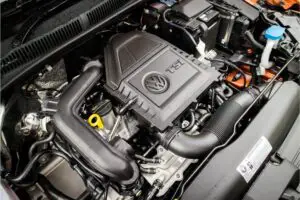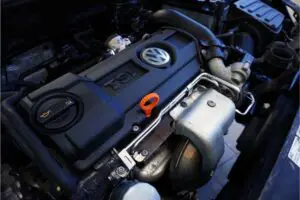Let’s get one thing out of the way, and that is, Volkswagen makes some exceptionally solid engines.
And that includes the 1.4L TSI engine. It has been available for general consumers since 2005, and it has won numerous awards.
Another thing about all Volkswagen engines is that they ship with the same faults. There are some drawbacks to owning this engine that you will find in other ones too.
Let me outline some of the VW 1.4 TSI engine problems:
- Failure Of The Ignition Coils
- Unusually High Oil Consumption
- Failure Of The Timing Chain Tensioner
- Slow Warming Up Of The Engine
All of these problems require immediate attention. This article will go over these issues and will also discuss different repair options, where applicable.
So, without any further ado, let’s get straight into it!
Table of Contents
- 1 The 4 Most Common VW 1.4 TSI Engine Problems
- 2 What Is The Volkswagen 1.4 TSI Engine?
- 3 Is The Volkswagen 1.4 TSI Engine Reliable?
- 4 What Cars Use The Volkswagen 1.4 TSI Engine?
- 5 Volkswagen 1.4 TSI Engine Specs
- 6 The Benefits Of Choosing The 1.4L TSI Engine
- 7 Frequently Asked Questions
- 8 Conclusion
The 4 Most Common VW 1.4 TSI Engine Problems

If you read through the introduction, then you must know that all of the mentioned issues are quite serious.
This section of the article will now solely discuss those issues.
1. Failure Of The Ignition Coils
The fact that this problem made its way into this article tells you how reliable the 1.4L engine really is.
The failure of ignition coils is something that happens on all vehicles after a certain mileage. So, it is not an issue exclusive to the 1.4L engine.
Reasons For The Issue
The thing that no engine can avoid is to wear and tear. Every moving part of the engine is bound to get worn to the point that it would stop working. Ignition coils are one of them.
As the Volkswagen engine is turbocharged, the coils handle even more strain than normal, causing them to stop working after a relatively short time.
Ignition coils should last around 100000 miles, even on turbocharged engines.
Diagnosis
A faulty ignition coil is something that is quite easy to catch.
There are many symptoms, which you can be on the lookout for if you suspect that the coils are reaching their end of life:
- P0300-P0304 error codes.
- Turning on of the check engine light.
- The engine rough idles.
- Difficulty in starting the engine.
Although these symptoms will not confirm the presence of the issue, apart from the first one, they will help you in narrowing down the root of the problem.
Repair
It is always advised to get all of the ignition coils replaced when one goes out.
The reason for this is that you really don’t want there to be any compatibility issues when the old and new hardware tries to work together.
The good news is, you can avoid a trip to a mechanic and can install the coils on your own. The process is quite simple.
2. Unusually High Oil Consumption
It’s not every day you hear about a vehicle engine suddenly upping its oil consumption. But, apparently, the issue is more widespread than you might think in the VW 1.4L TSI engine.
The Issue
After extensive research, I found out that the oil consumption issue is seen on the older model of the engine, the EA111, the one which has been in production since 2005.
The main reason for there to be a high oil consumption is due to the use of low-quality pistons and pistons rings. Yes, they can indeed cause a massive difference in oil consumption.
Another reason for this issue is that if you have put incompatible oil in the engine. The engine accepts the 5W-30 oil. Anything other than that can cause major issues for the engine.
Symptoms
There are many different ways you can confirm if the engine is consuming more oil than normal.
Some of the common symptoms are:
- A sudden drop in performance.
- The engine is facing an oil deposit problem.
- Increased fuel consumption.
- The engine is consuming more than one quart of oil every 1000 miles.
You must get the issue diagnosed and fixed easily to make sure the engine does not sustain any long-lasting damage.
Fixing The Issue
There is only one clear choice, and that is to get the pistons replaced completely.
You need to get rid of all the low-quality hardware and install ones that is able to work better in intense conditions.
On the off chance that you don’t get the problem fixed, then you may be looking at a rebuild of the entire engine, which costs a lot than the few hundred dollars it would take to fix the issue.
3. Failure Of The Timing Chain Tensioner
Function
I will now be talking about an issue that is quite serious, and it includes the timing chain tensioner.
So, what is the purpose of this engine part?
Well, the timing chain tensioner ensures that the timing chain’s temperature is always maintained.
As the chain handles many other components, the failure of the tensioner could lead to catastrophic damage.
The Problem
Before I continue with this issue, I must clarify that the tensioner issue is present in the older variant of the engine, the EA111.
The EA211 variant shifted to a belt, which eliminated the problem altogether. The issue is quite common in Volkswagen engines.
The reason for the tensioner to fail is because, at that time, Volkswagen was not known for making high-quality engines. The low-quality construction of the tensioner caused the issue.
Symptoms And Repair
There are many symptoms associated with the failure of the tensioner.
Some of the common ones are:
- Degraded performance.
- The rattling sound coming from the engine.
- Oil pan containing shaving.
All of these issues suggest that the timing chain or the tensioner may be at fault. It is better to get it properly diagnosed.
The whole timing chain system needs to be replaced, which can easily cost you north of $1000.
Unfortunately, this job is too complex to be done by yourself. Not only is reaching the chain a tedious task, but getting the replacement done is a time confusing and tricky process.
One wrong step, and you are looking at possibly irreparable WV 1.4 TSI engine damage. So, it would be better to let the professionals handle this one.
4. Slow Warming Up Of The Engine
The last issue of this article has finally arrived. Although this issue is not that common, it definitely deserved a spot on the list.
There were a few users that complained about the 1.4 TSI engine warming up very slowly. Again, this is an issue I have never seen in engines from other manufacturers.
The Issue
Unlike the previous problems, which mostly occurred on the EA111 variant of the engine, this one was also found to be common in the improved EA211 variant too.
People complained that their engines had a warm-up time of ten to fifteen minutes, which is a lot, considering this is a modern engine.
Reasons
Unfortunately, this issue cannot be fixed. This is neither a design flaw but one trait of being a small engine. It is indeed true that the engine is a small one.
Its displacement is much smaller than ones like the Volkswagen 2.5L. So, the engine, by nature, has an overall less heat output.
Fixing The Problem
Unfortunately, you cannot change the basic characteristics of an engine. What you can do is change your timing accordingly.
Of course, it will take some time to adjust, but that is the best way to go!
The things you could do are:
- Startup the vehicle 15 minutes before your departure time.
- Avoid using the vehicle until it has warmed up.
Although the second point is something I am sure most of you must follow, I want to tell you its importance.
Unless the engine reaches optimal temperature gradually, there is a very high risk of components failing due to sudden temperature change.
What Is The Volkswagen 1.4 TSI Engine?
The 1.4 TSI is a turbocharged engine. It has been in production for quite some time now, with general availability starting in 2005 and still available as of 2021.
There are two main versions of the engine, the EA111, and the EA211. The 211 is the successor to the first one and brought in major changes, which improved the reliability.
The performance of both of them is generally the same. One incredible inclusion in the engine is a water-cooled intercooler, which has been placed into the intake manifold.
This cooling system is highly effective and allows the engine to keep the temperature in check.
Is The Volkswagen 1.4 TSI Engine Reliable?
I can assure you that the TSI engine is very reliable. The company has made a solid engine, and it knows that.
Why else would it be in production more than 15 years later?
The manufacturer also improved the engine design with the EA211, which means they acknowledged its mistakes and fixed them too.
Believe me; this is a lot better than issuing extended warranties. But there is one thing you must keep in mind.
As the EA211 can be called a modern engine, its parts are quite complex too. This makes any repairs much more expensive than the predecessor.
What Cars Use The Volkswagen 1.4 TSI Engine?
Over the years, Volkswagen made sure to use this engine for as many vehicles as possible.
Let me outline all of them:
Volkswagen:
Audi:
- A3
- A4
Other Manufacturers:
- Seat Ibiza FR
- Skoda Fabia RS
- Seat Leon
- Skoda Rapid
- Seat Ibiza Cupra
- Skoda Superb
- Skoda Octavia II
Volkswagen 1.4 TSI Engine Specs
| Cylinder block composition | Aluminium only |
| Chamber head composition | Aluminum only |
| Fuel type | Gasoline |
| Injection type | Gasoline direct injection |
| Arrangement | In-line |
| Total cylinders | 4 |
| Valves in each cylinder | 4 |
| Valvetrain layout | DOHC |
| Bore | 2.93 inches or 74.5m |
| Stroke | 3.15 inches or 80mm |
| Displacement | 1395cc or 1.4L |
| Combustion type | Turbocharged, Four stroke |
| Ratio | 10.5:1 |
| Power/hp | 122 – 150 hp |
| Torque/ft.lb | 147 – 184ft.lb |
| Engine oil weight | 5W-40, 5W-30 |
| Engine oil capacity | 3.8 quarts w/filter |
| Firing directive | 1-3-4-2 |
| Oil change duration | 12000-miles (20000 km) or twelve months |
The Benefits Of Choosing The 1.4L TSI Engine
Enough about the drawbacks of the engine! Many of you may not be second-guessing your decision to buy the engine.
Well, let me tell you some of the pros of owning it, which you should definitely consider:
- It uses a water-cooled cooling system, which keeps the engine cool at all times.
- The EA211 variant has many of the issues, which plagued the older model, fixed.
- The engine has an automatic valve clearance adjustment system.
- It uses direct fuel injection, which allows for better performance gains.
- The ACT system can switch off unused cylinders, decreasing fuel consumption.
Frequently Asked Questions
Q1. How Long Do Volkswagen TSI Engines Last?
Although the engine is durable, it will not last as long as some other engines. According to reports, it can last anywhere from 150000 to 200000 miles.
The 300000-mile mark is something that is quite rare for Volkswagen engines to achieve. So, the engine makes up in performance.
Q2. Is TSI Better Than TDI?
Now, this right here is an excellent question. Both of the engines are made by Volkswagen.
The one main difference is that the TDI engine runs on diesel while the other one, like the 1.4 TSI, runs on gasoline.
Unfortunately, the only thing TSI engines lose is the fuel economy. Other than that, the performance is quite similar.
Q3. How Do I Make Sure That The 1.4 TSI Engine Requires As Little Work As Possible?
There is only one thing you should do, and that is keeping the engine maintained at all times.
If you keep the engine maintained and fix any issues as soon as they appear, not giving them a chance to spread, the engine will retain 100% efficiency.
This will also keep the overall maintenance costs low.
Conclusion
If you want a one-lined conclusion of the engine’s reliability, then I think it will be more than sufficient to say that the 1.4L engine is pretty reliable.
I personally think that buying it will be a great decision.
Although there are a few VW 1.4 TSI engine problems, they will not cause any major problems as long as you keep the engine in pristine condition.
Now, the HP of the engine will not blow you out of the water, but it will be enough for your daily driving needs. If you choose to buy it, you will have a memorable driving experience.
Resources:
1. https://vwtuning.co/vw-1-4-tsi-engine-problems/
2. https://www.motorreviewer.com/engine.php?engine_id=116

I am Tahir Azam, and I have been writing amazing articles for TaxiHack for as long as I can remember. I know everything that is to know when it comes to automobiles and is always on top of industry news and developments. While I am not an expert by any means, I pride myself on knowing the ins and outs of many different problems and, of course, their solutions. The articles on our website are some of the best and well-researched content that you will find, and I spend countless hours making sure this remains to be true. This is why I ask you to take your time out and read some of my articles, especially if you find a topic that resonates with you or is something you are looking into. This way, you will find the perfect mix of information and tips on your desired topic. Learn more about Tahir.

